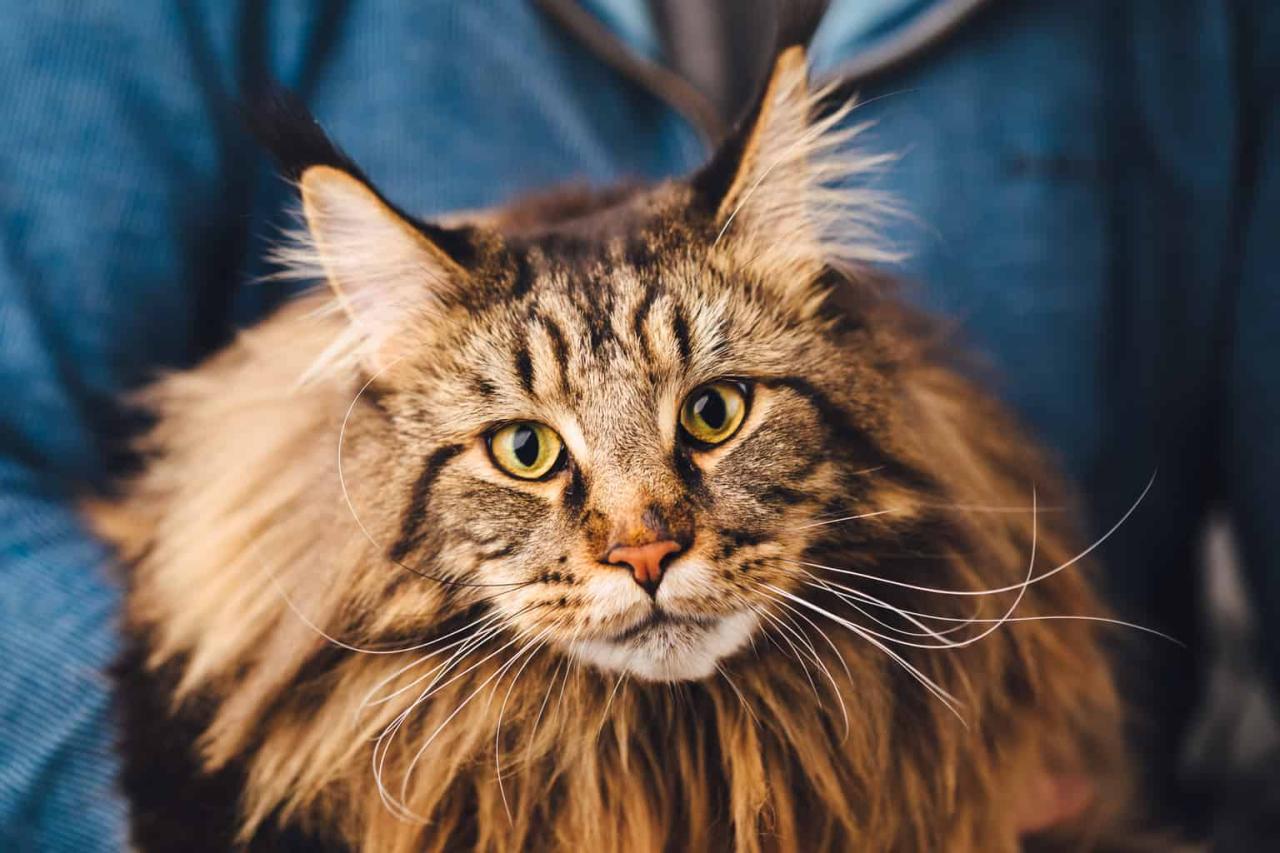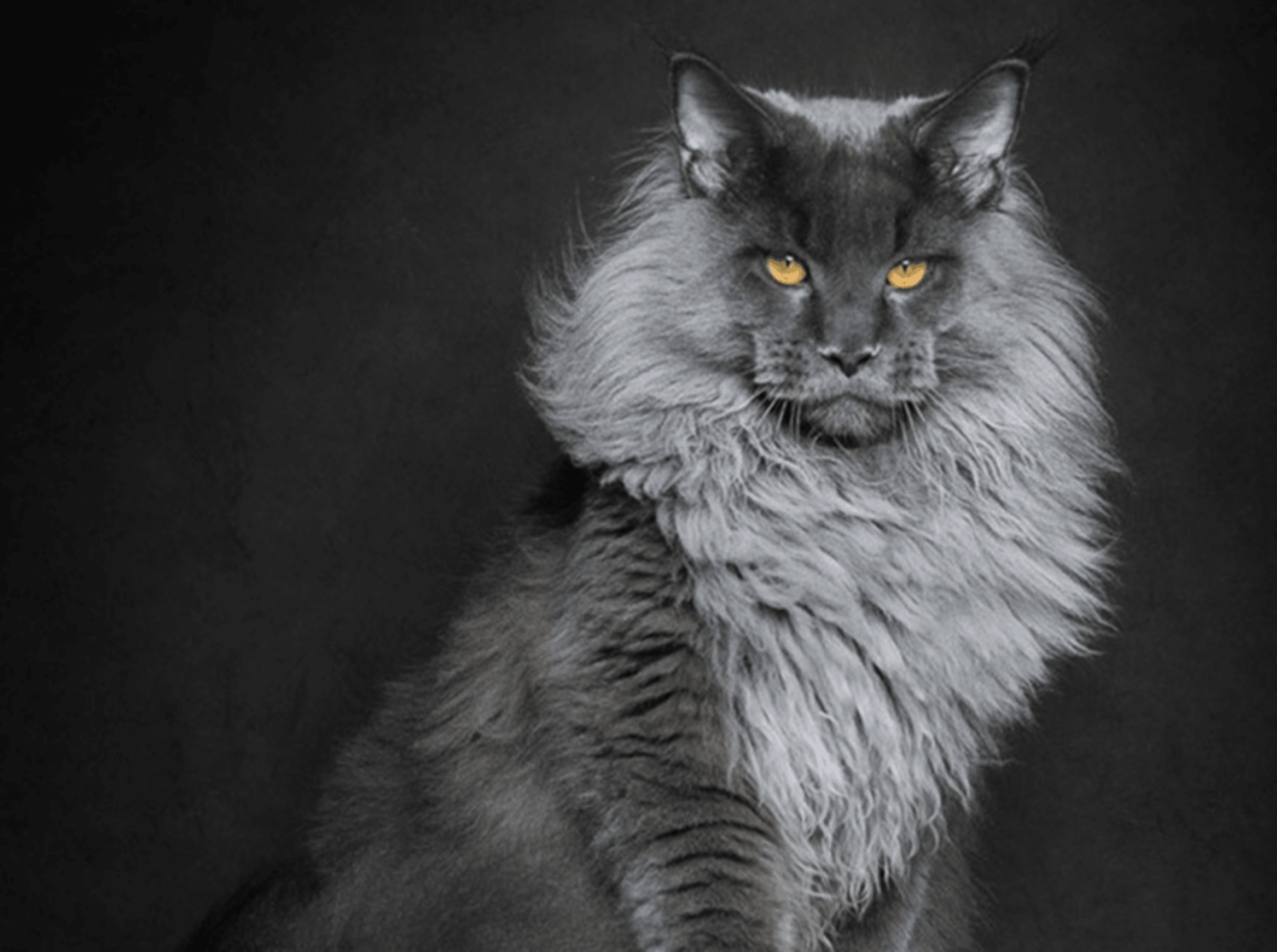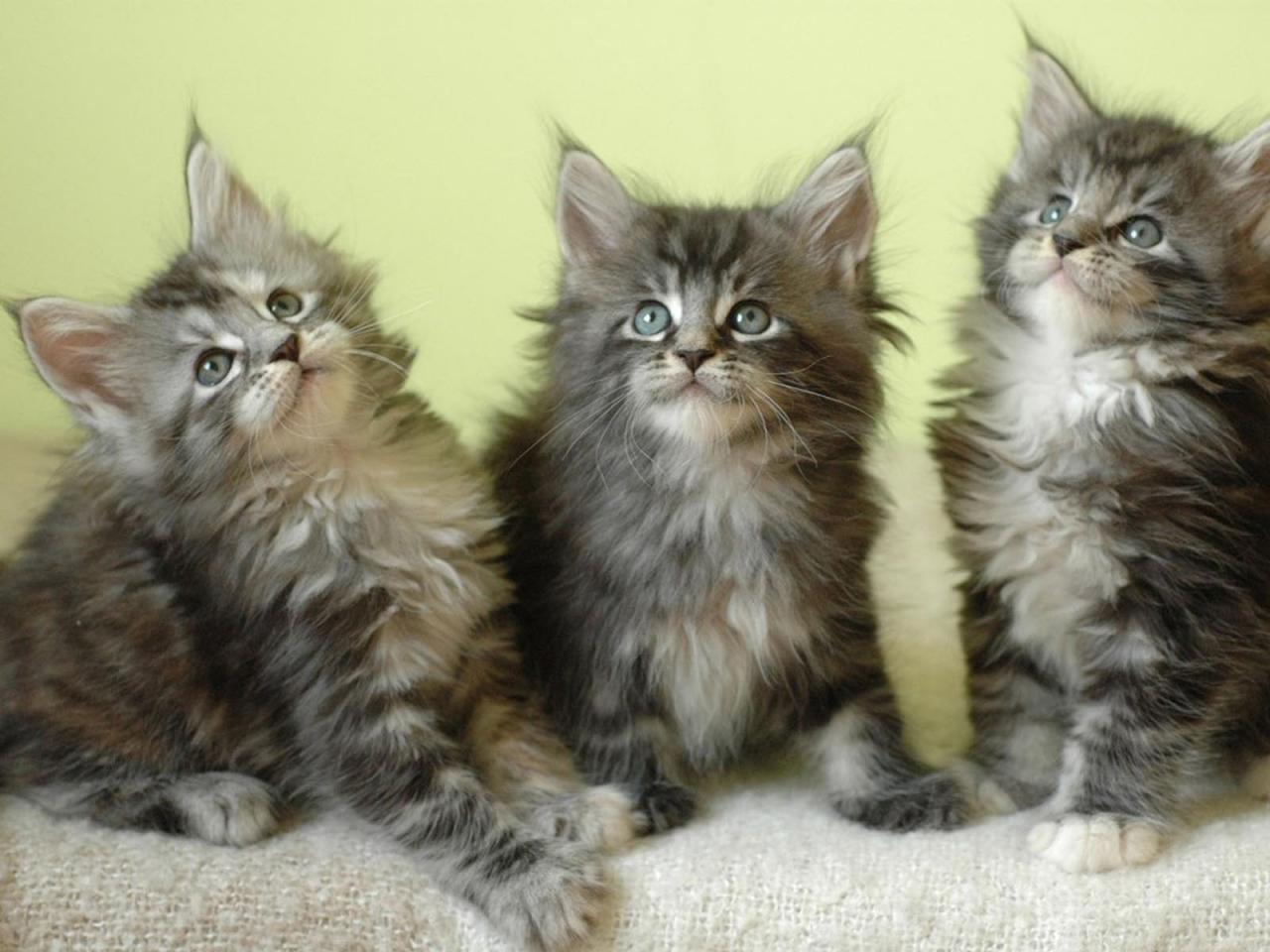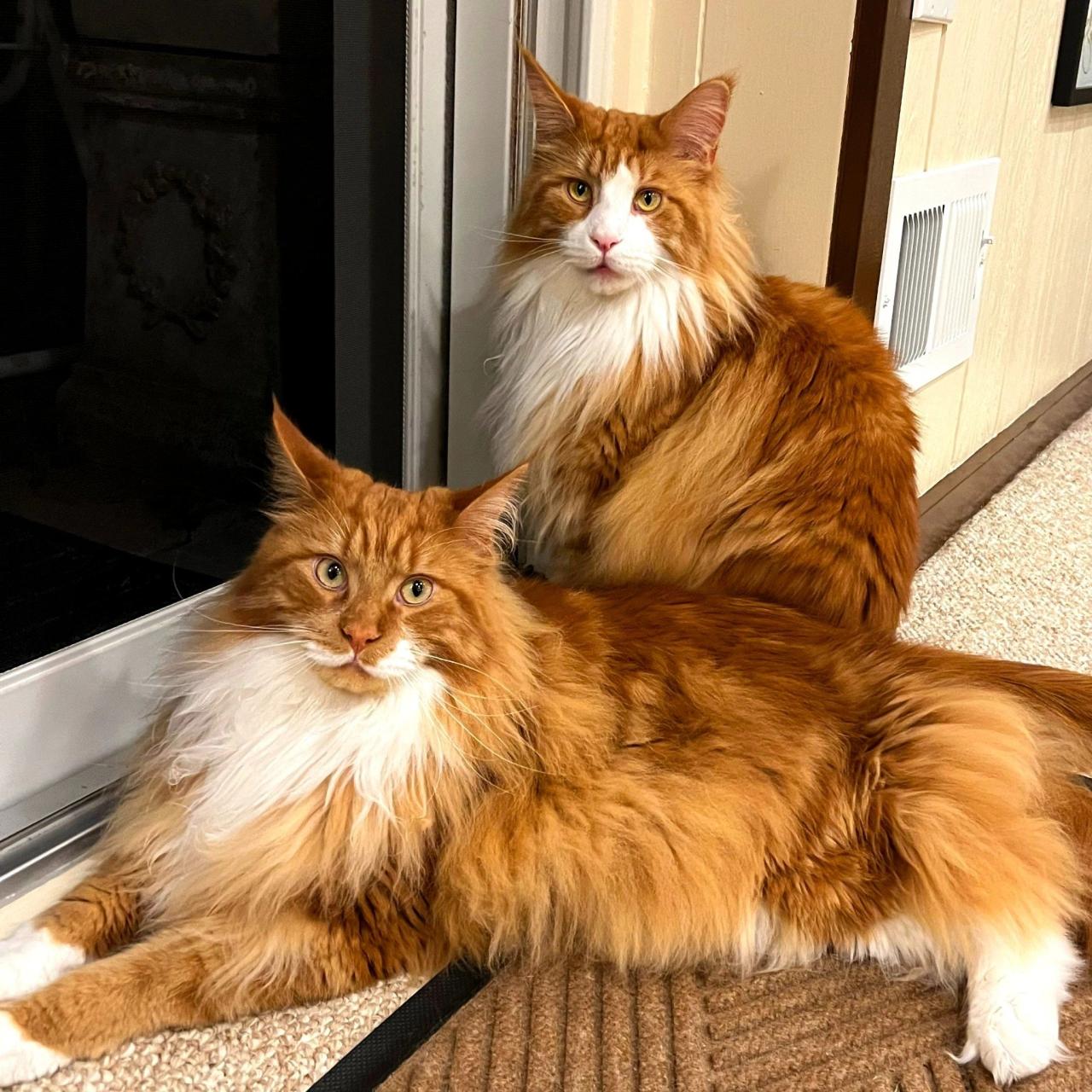Welcome to the enchanting world of Maine Coon cattery, where these majestic felines steal hearts with their gentle giant demeanor and captivating presence. As we delve into the intricacies of this esteemed breed, we’ll uncover their unique traits, delve into responsible breeding practices, and explore the art of providing exceptional care for these beloved companions.
From their distinctive physical characteristics to their captivating personalities, Maine Coons are a breed that commands attention and admiration. Their flowing manes, tufted ears, and piercing gazes are just a few of the attributes that set them apart. Their playful nature, intelligence, and affectionate disposition make them not only stunning but also delightful additions to any home.
Maine Coon Breed Overview
The Maine Coon is a large, rugged cat breed known for its distinctive appearance and gentle personality. Originating in the state of Maine, these cats are renowned for their thick, flowing coats, bushy tails, and large paws.
Maine Coons are known for their affectionate and playful nature. They are intelligent and curious, often forming strong bonds with their human companions. Their gentle demeanor makes them excellent pets for families with children.
Physical Characteristics
- Size:Maine Coons are one of the largest domestic cat breeds, with males typically weighing 13-18 pounds and females weighing 8-12 pounds.
- Coat:Their coats are thick and luxurious, with a water-resistant outer layer and a soft, dense undercoat. The coat comes in a wide variety of colors and patterns, including brown tabby, black, and white.
- Tail:The tail is long and bushy, often reaching the cat’s shoulders. It is covered in thick fur, providing warmth and balance.
- Paws:Maine Coons have large, furry paws that help them navigate snowy terrain. Their toes are often tufted with fur, giving them a distinctive appearance.
Temperament, Maine coon cattery
- Affectionate:Maine Coons are known for their loving and affectionate nature. They enjoy being petted and cuddled, and they often form strong bonds with their owners.
- Playful:These cats are playful and energetic, especially as kittens. They love to chase toys, climb, and explore their surroundings.
- Intelligent:Maine Coons are intelligent and curious cats. They are quick learners and can be taught tricks and commands.
- Gentle:Despite their large size, Maine Coons are gentle and docile cats. They are not known for being aggressive or territorial.
Origin
The exact origins of the Maine Coon breed are unknown, but there are several theories. One theory suggests that they descended from longhaired cats brought to North America by European settlers. Another theory claims that they are the result of natural crossbreeding between domestic cats and wild bobcats.
Cattery Management

Managing a Maine Coon cattery requires a comprehensive approach that encompasses breeding practices, health care, and socialization. Maintaining high standards of care is paramount to ensure the well-being and quality of the cats.
Breeding Practices
- Selective breeding: Breeders carefully select breeding pairs based on desired traits, such as coat quality, size, and temperament.
- Health testing: Breeding cats undergo genetic and health screenings to minimize the risk of inheritable diseases.
- Kitten development: Kittens are provided with a nurturing and stimulating environment to promote proper growth and socialization.
Health Care
- Regular veterinary checkups: Cats receive routine examinations, vaccinations, and parasite control.
- Emergency care: Breeders are prepared to provide immediate medical attention in case of emergencies.
- Nutrition: High-quality diets are essential for maintaining optimal health and coat condition.
Socialization
- Early socialization: Kittens are exposed to a variety of experiences and people from a young age to promote confidence and adaptability.
- Positive reinforcement: Breeders use positive reinforcement techniques to encourage desirable behaviors and build a strong bond with the cats.
- Play and enrichment: Cats are provided with toys, interactive activities, and enrichment to stimulate their physical and mental well-being.
Genetics and Health
The Maine Coon is a distinctive breed with several unique traits, including its large size, long, flowing coat, and tufted ears. These traits are the result of a complex interplay of genetic factors.
One of the most important genes that contribute to the Maine Coon’s size is the growth hormone gene. This gene is responsible for regulating the production of growth hormone, which plays a key role in determining the size of an animal’s body.
Maine Coons have a mutation in the growth hormone gene that causes them to produce more growth hormone than other cats, resulting in their larger size.
Another gene that contributes to the Maine Coon’s unique coat is the longhair gene. This gene is responsible for determining the length of a cat’s hair. Maine Coons have a mutation in the longhair gene that causes them to produce longer hair than other cats.
The Maine Coon’s tufted ears are also the result of a genetic mutation. This mutation affects the shape of the ear cartilage, causing the ears to be tufted at the tips.
Common Health Issues
Like all breeds of cats, Maine Coons are susceptible to a number of health issues. Some of the most common health issues associated with the breed include:
- Hypertrophic cardiomyopathy (HCM):HCM is a condition in which the heart muscle becomes thickened. This can lead to heart failure and is the leading cause of death in Maine Coons.
- Polycystic kidney disease (PKD):PKD is a condition in which cysts develop in the kidneys. These cysts can eventually lead to kidney failure.
- Hip dysplasia:Hip dysplasia is a condition in which the hip joint does not develop properly. This can lead to pain, lameness, and arthritis.
- Dental disease:Maine Coons are prone to dental disease, including gingivitis and periodontitis. This can lead to pain, tooth loss, and other health problems.
There are a number of things that can be done to prevent and treat these health issues. Regular veterinary care is essential for detecting and treating health problems early. In addition, there are a number of things that you can do at home to help keep your Maine Coon healthy, including:
- Providing a healthy diet
- Exercising your cat regularly
- Brushing your cat’s teeth regularly
- Taking your cat to the veterinarian for regular checkups
Grooming and Care
Maine Coons have a luxurious, double-layered coat that requires regular grooming to keep it in pristine condition. Their grooming needs include brushing, bathing, and nail care, along with regular veterinary checkups and vaccinations to maintain their health and well-being.
Brushing
Brushing is an essential part of Maine Coon grooming. Their long, flowing fur tends to tangle and mat easily, so brushing at least twice a week is necessary to prevent painful knots and mats. Use a wide-toothed comb or a slicker brush to gently remove loose hair, tangles, and debris.
Start at the head and work your way down to the tail, being careful not to pull or tug on the fur.
Bathing
Maine Coons are not known for being fans of water, but occasional baths are necessary to keep their coat clean and healthy. Use a mild, pH-balanced shampoo designed for cats and lukewarm water. Wet the cat thoroughly, avoiding the head and face, and gently massage the shampoo into the coat.
Rinse thoroughly to remove all shampoo residue. Towel dry the cat and allow them to air dry or use a hairdryer on a low setting.
Nail Care
Regular nail trimming is important for Maine Coons to prevent overgrown nails from causing discomfort or injury. Use a sharp nail clipper or grinder to trim the nails to a comfortable length. Avoid cutting the nails too short, as this can cause pain and bleeding.
If you are not comfortable trimming your cat’s nails yourself, consult a professional groomer or veterinarian for assistance.
Veterinary Care
Regular veterinary checkups are crucial for maintaining the health of Maine Coons. Annual checkups should include a physical examination, vaccinations, and parasite screening. Vaccinations protect against common feline diseases such as distemper, rabies, and feline leukemia. Parasite screening helps detect and treat parasites such as fleas, ticks, and worms.
Kitten Development and Training: Maine Coon Cattery
Maine Coon kittens undergo a remarkable transformation from birth to adulthood. Understanding their developmental milestones is crucial for providing appropriate care and training.
Timeline of Kitten Development
*
-*Birth to 2 weeks
Kittens are born blind and deaf, relying on their mother for warmth, nourishment, and elimination.
-
-*2 to 4 weeks
Eyes and ears open, and kittens begin to explore their surroundings. They develop a sense of balance and coordination.
-*4 to 8 weeks
Kittens start to play and interact with their littermates. They learn basic social skills and develop their hunting instincts.
-*8 to 12 weeks
Kittens become more independent and start to wean from their mother’s milk. They develop their adult teeth and begin to explore outside their nest.
-*12 to 18 months
Kittens reach physical maturity and begin to resemble adult Maine Coons. They continue to refine their social and hunting skills.
Training and Socialization
Proper training and socialization are essential for raising well-adjusted Maine Coon cats. Here are some tips:*
-*Start early
Begin training as soon as kittens open their eyes.
-
-*Use positive reinforcement
Reward kittens for desired behaviors with treats, praise, or play.
-*Be patient and consistent
Training takes time and patience. Avoid punishing kittens for mistakes.
-*Introduce new experiences gradually
Gradually expose kittens to new people, places, and situations to build their confidence.
-*Encourage play
Playtime provides kittens with physical and mental stimulation, helping them develop coordination and social skills.
Maine Coon Personality and Temperament

Maine Coons are renowned for their affectionate, intelligent, and playful nature. They are highly social cats that enjoy spending time with their human companions and other pets. Their playful demeanor and gentle nature make them excellent companions for families with children.
Affectionate and Loyal Companions
Maine Coons are extremely affectionate cats that crave attention and love. They will often follow their owners around the house, seeking cuddles and petting. Their loyalty is unwavering, and they form strong bonds with their families.
Intelligent and Curious
Maine Coons are highly intelligent cats that are always curious about their surroundings. They love to explore and learn new things. Providing them with interactive toys and puzzles can help stimulate their minds and keep them entertained.
Playful and Active
Despite their large size, Maine Coons are surprisingly playful and active. They enjoy chasing toys, climbing cat trees, and exploring their environment. Providing them with plenty of opportunities for exercise and play is essential for their well-being.
Maine Coon Lifespan and Care

Maine Coons are known for their longevity, with an average lifespan of 12 to 15 years. With proper care, some Maine Coons may even live for 20 years or more. To ensure the well-being of your Maine Coon throughout its life, it’s essential to provide a healthy diet, adequate exercise, and plenty of companionship.
Diet and Nutrition
A healthy diet is crucial for the health and longevity of Maine Coons. Choose high-quality cat food that is specifically formulated for large breeds. Avoid feeding your cat table scraps or processed foods, as these can contribute to obesity and other health problems.
It’s also important to ensure that your cat has access to fresh water at all times.
Exercise
Maine Coons are active cats that require regular exercise to stay healthy and happy. Provide your cat with plenty of opportunities to play and explore, such as interactive toys, cat trees, and outdoor access if possible. A lack of exercise can lead to obesity, boredom, and destructive behavior.
Companionship
Maine Coons are social animals that thrive on companionship. If you work long hours or are often away from home, consider getting a second cat to keep your Maine Coon company. Alternatively, you can provide your cat with interactive toys and puzzles to keep it entertained while you’re away.
Cattery Design and Facilities

The design of a cattery for Maine Coons should prioritize the cats’ well-being and comfort. The cattery should be designed to meet the unique needs of this breed, including their size, activity level, and grooming requirements.
Creating a safe, comfortable, and stimulating environment is essential for the cats’ physical and mental health. This includes providing ample space for exercise, hiding places, and interactive toys.
Ventilation and Air Quality
- Proper ventilation is crucial to maintain good air quality and prevent respiratory issues in cats.
- Install an air filtration system to remove allergens and improve air quality.
Lighting
- Provide natural light whenever possible, as cats need sunlight for their well-being.
- Supplement with artificial lighting to ensure adequate light levels throughout the day.
Flooring
- Choose non-slip flooring to prevent injuries, especially for senior cats or those with mobility issues.
- Consider using a combination of carpet and tile to provide both comfort and easy cleaning.
Walls and Ceilings
- Use durable and easy-to-clean materials for walls and ceilings, such as paint or tile.
- Provide scratching posts and other vertical surfaces to encourage cats to exercise and prevent wall damage.
Cat Runs and Outdoor Spaces
- If possible, provide access to outdoor runs or enclosed patios for cats to enjoy fresh air and exercise.
- Secure the outdoor areas to prevent escapes and ensure the cats’ safety.
Marketing and Sales
Effective marketing strategies are crucial for the success of a Maine Coon cattery. It involves reaching potential customers and highlighting the unique qualities of the breed to generate interest and drive sales.
One effective marketing approach is to establish a strong online presence through a professional website and social media platforms. The website should provide comprehensive information about the cattery, the Maine Coon breed, and available kittens or adult cats. High-quality images and videos showcasing the cats’ beauty and temperament can enhance the website’s appeal.
Social Media Marketing
- Social media platforms like Facebook, Instagram, and Twitter offer excellent opportunities to connect with potential customers. Regularly posting engaging content, such as photos and videos of the cats, breed information, and customer testimonials, can help build a loyal following.
- Running targeted social media ads can further expand the reach and engage with specific audiences interested in Maine Coons.
Networking and Collaborations
- Attending cat shows and events provides opportunities to showcase the cattery’s cats and network with potential customers and breeders.
- Collaborating with other Maine Coon breeders or businesses related to the breed can create mutually beneficial partnerships and expand the cattery’s reach.
Customer Service and Reputation Management
- Excellent customer service is essential for building a positive reputation and fostering customer loyalty. Promptly responding to inquiries, providing detailed information, and ensuring a smooth sales process are crucial.
- Encouraging customer reviews and testimonials can provide social proof and build trust among potential buyers.
Customer Service and Support
Providing excellent customer service is essential for any business, and catteries are no exception. Maine Coon owners are passionate about their cats and expect the same level of care and attention from their breeder. By going above and beyond to meet the needs of your clients, you can build lasting relationships and ensure their satisfaction.
Here are some tips for providing excellent customer service to Maine Coon owners:
Communication
- Respond promptly to inquiries and requests.
- Be clear and concise in your communication.
- Provide regular updates on the status of kittens and any other relevant information.
- Use multiple channels of communication (e.g., email, phone, social media).
Knowledge and Expertise
- Be knowledgeable about Maine Coons and their specific needs.
- Provide accurate and up-to-date information to clients.
- Be able to answer questions and provide advice on a variety of topics.
Personalization
- Get to know your clients and their individual needs.
- Tailor your services to meet the specific requirements of each client.
- Go the extra mile to make your clients feel valued and appreciated.
Problem Resolution
- Be responsive to complaints and concerns.
- Work quickly to resolve any issues.
- Be fair and reasonable in your approach to problem-solving.
Feedback
- Regularly seek feedback from your clients.
- Use feedback to improve your services and meet the needs of your clients.
- Thank clients for their feedback and let them know that their input is valued.
Ethical Considerations

As Maine Coon breeders, we have an ethical responsibility to uphold the breed’s standards and promote responsible breeding practices that prioritize the welfare of our cats.
Adhering to Breed Standards
Maintaining the integrity of the Maine Coon breed is paramount. Breeders must adhere to established standards, ensuring that cats conform to the breed’s distinctive physical characteristics, temperament, and health.
Responsible Breeding Practices
Responsible breeding involves selecting cats with desirable traits and avoiding genetic defects. Breeders should prioritize health testing, genetic screening, and responsible breeding programs to prevent the spread of genetic disorders.
Cat Welfare
The welfare of our cats is our utmost priority. Breeders must provide a clean, safe, and stimulating environment, ensuring access to proper nutrition, veterinary care, and socialization. Ethical breeders prioritize the well-being of their cats above profit or convenience.
Conclusive Thoughts
As we conclude our exploration of Maine Coon cattery, we recognize the profound responsibility that comes with breeding and caring for these magnificent creatures. By adhering to ethical standards, promoting responsible practices, and providing unwavering care, we honor the legacy of this remarkable breed.
May the bond between humans and Maine Coons continue to flourish, enriching our lives with their companionship and unwavering loyalty.
